The Census is Not Constitutional

This page changed with the April 02, 2024 edit.
To move all ads to bottom of screen, shrink the window width
Be part of the success!
Help spread the word!

This page changed with the April 02, 2024 edit.
Most people are so accustomed to doing a census, every 10 years, that they never question its constitutional validity. After all, the word census does appear in The Constitution twice; (Article 1, Section 9, Clause 4; and Amendment 16); so it must be "constitutional".... Right?
The general reasoning? The government has been doing a census for so long; it must be authorized, ... Right?
With a word search in The Constitution of the United States of America, and for dramatic effect and better comprehension, the starting point for the census word search is from the end of The Constitution, working toward the front. Hint: The two above listed locations are the only places we find the word census in The Constitution.
If you do not own a copy of The Constitution, with all of its amendments; you may use the searchable content of this copy of
The Constitution of the United States of America
The very last mention of the word census appears in Amendment 16, which states:
"The Congress shall have power to lay and collect taxes on incomes, from whatever source derived, without apportionment among the several States, and without regard to any census or enumeration."
Now, we must deal with two words, census and enumeration. Here, both of them are expressly prohibited.
Continuing the search for 'census' towards the beginning of The Constitution, it next appears at: Article 1, Section 9, Clause 4, which states:
"No Capitation, or other direct, Tax shall be laid, unless in Proportion to the Census or enumeration herein before directed to be taken."
The two words, census and enumeration also appear together, but neither are granted here either. However, this mention provides a clue as to whether or not a census and enumeration are the same thing, as apples and apples are the same type of fruit. Or: Are they as different as apples and pumpkins, but similar in that they both are fruits? See Guinness World Records: Largest Fruit
The clue from Article 1, Section 9, Clause 4 resides in these words, "herein before directed to be taken".
Somewhere prior to Article 1, Section 9, either the census or the enumeration; was authorized.
Continuing the search towards the beginning of The Constitution, the word census no longer shows up. However, the word enumeration appears twice in Article 1, Section 2, Paragraph 3, which states:
"Representatives and direct Taxes shall be apportioned among the several States which may be included within this Union, according to their respective Numbers, which shall be determined by adding to the whole Number of free Persons, including those bound to Service for a Term of Years, and excluding Indians not taxed, three fifths of all other Persons. The actual Enumeration shall be made within three Years after the first Meeting of the Congress of the United States, and within every subsequent Term of ten Years. . . , in such Manner as they shall by Law direct; and until such enumeration shall be made. . ." (the italicized portion above is said to have been altered by a later amendment).
No place in The Constitution does it grant to Congress the power to conduct a census, —only an enumeration. Its also expressly defines the scope and purpose for that enumeration. It purpose is for determining how many Representatives each State may have in The House of Representatives of Congress. The scope of the enumeration, which is the power granted to Congress, is to count the numbers of the people in each state, according to the terms dictated; and that is all.
The best practice to define words in older public document is to use a dictionary published prior to the document signing. Since the word census does not appear in the 1785 dictionary, for the 1790 Constitution of the United States of America; older, not newer, definitions must be used. The reason for older dictionaries, as opposed to newer ones becomes obvious.
For this instance; it is necessary to run a series of definitions, in a timeline from "Censor", in 1708 through 1898 to "Census". This exercise demonstrates word evolution in action; and how those changing definitions can negatively impact the citizen's life.

Censor
a Magistrate, whose Office it was to take an exact view of the People of Rome, to value the Estate of every Citizen, and to reform manners.

Censor
1. An officer of Rome, who had the power of correcting manners.
2. One who is given to censure.
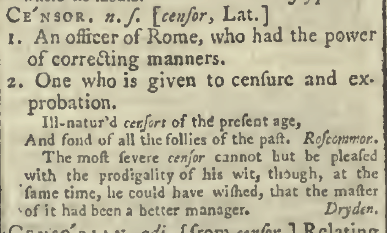
Censor
1. An officer of Rome, who had the power of correcting manners.
2. One who is given to censure and exprobation.
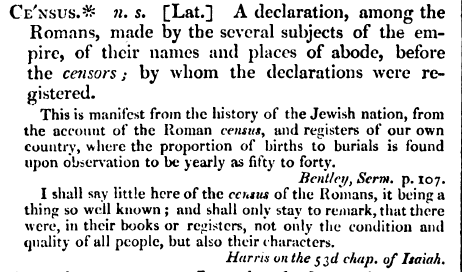
Census
A declaration, among the Romans, made by the several subjects of the empire, of their names and places of abode, before the censors; by whom the declaration were registered.
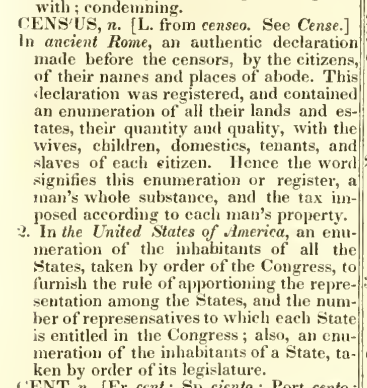
Census
1. In ancient Rome, an authentic declaration made before the censors, by the citizens, of their names and places of abode. This declaration was registered, and contained an enumeration of all their lands and estates, their quantity and quality, with the wives, children, domestics, tenants, and slaves of each citizen. Hence the word signifies this enumeration or register, a man's whole substance, and the tax imposed according to each man's property.
2. In the United States of America, an enumeration of the inhabitants of all the States, taken by order of the Congress, to furnish the rule of apportioning the representation among the States, and the number of representatives to which each State is entitled in the Congress; also, an enumeration of the inhabitants of a State, taken by order of its legislature.
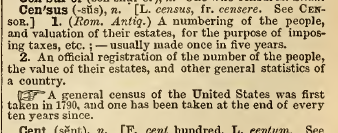
Census
1. A numbering of the people, and the valuation of their estates, for the purpose of imposing taxes, etc.; --usually made once in five years.
2. An official registration of the number of the people, the value of their estates, and other general statistics of a country.
☞ A general census of the United States was first taken in 1790, and one has been taken at the end of every ten years since.
The above six definitions from 1708 through 1898 demonstrate the evolution of word definitions. Without knowing the context of the evolution; the evolution easily escapes detection.
In 1708 it accurately describes the modern census: "an exact view of the People of Rome, to value the Estate of every Citizen".
The 1756 and 1785 dictionaries drop the content of the view of the people and value of their estate to simply become "manners police".
In 1818, Johnson's 'census' definition matches The Constitution's description for 'enumeration'.
In 1828, Webster combines 'enumeration' as part of the 'census' definition. Then, he changes the constitutional description for 'enumeration' to include the value of estates. At this point; Webster makes the enumeration and the census synonymous; thus destroying the limited scope and constitutional definition and purpose for the enumeration.
Finally, in 1898, Webster made the complete transition from 'enumeration' to 'census'.
From here; this is where many people unnecessarily confuse the issue and go off-course. The thought is that Noah Webster, as an influential character the during The Declaration and Constitution; he is the best person from whom to get Constitutional definitions. So, people use the 1828 and the 1898 dictionaries, with definitions as seen above to declare that the census and the enumeration are the same thing (apples and apples).
Both, the 1828 and the 1898 definitions are from thirty to one-hundred years after The Constitution was ratified, in 1790. This is a form of amending The Constitution's content and meaning, without following the Article 5 amendment process.
It took just over 100 years from The Constitution's ratification; to Webster's 1898 definition for the enumeration to become, census.
All experts, must be challenged to verify their claims; especially when the government writes "authoritative" instruments used to interpret the meanings of the law intended to regulate the government's power.
A critical question hinges on whether the grant to do an enumeration authorizes Congress to alter the types of information collected, or just the manner by which the stated information may be collected; or perhaps both.
For this, we go back to the 1785 dictionary set to define the word manner; and also form, as form is used as part of the definition for manner.
Manner — 1785
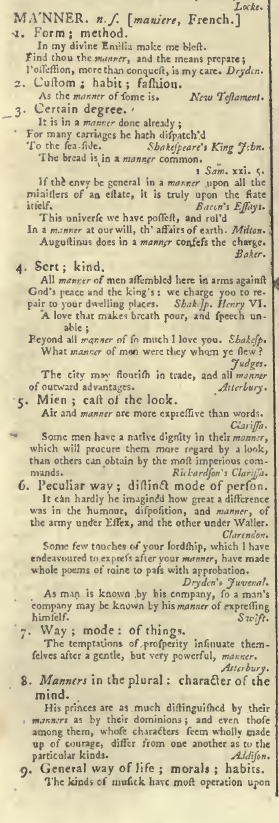
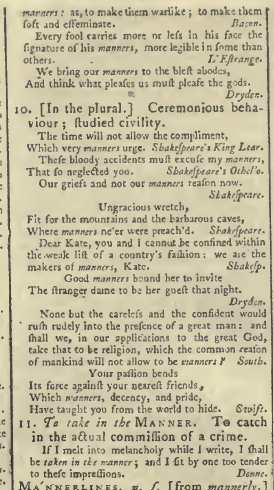
Manner
1. Form; method.
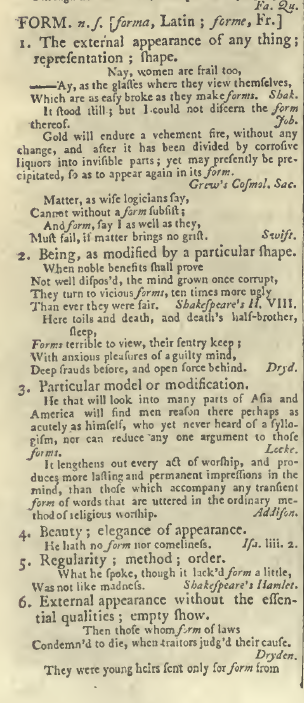

Form
1. The external appearance of any thing; representation; shape.
5. Regularity; method; order.
8. Stated method; established practice; ritual and prescribed mode.
Neither manner nor form suggest the power to change or increase the volume of information to be gathered; not even changing the purpose for gathering that information.
Congress may, by rights of granted power, only dictate the process (the manner) by which the limited information is to be collected. Does Congress want to just mail the forms to every known residence? Does Congress want to have a physical person knock on every residential door and count heads? Does Congress want to have every citizen, head of household fill out an internet form? All of these are manners by which Congress can rightly collect the limited data covering how may people reside in each respective state. —At most, the information of the enumeration might be; the names, addresses, congressional district, and state, as well as the date collected: That is all!–
This demonstrates how newer definitions can completely alter the content, after-the-fact; after a contract is signed, after a constitution is ratified, or after a law has passed. Dictionaries can alter the way people view their world and government powers. Dictionary definitions are not supposed to change the meaning of words used, after they are used. The definitions are supposed to help a person, after, the fact, better comprehend the original purpose and intent of specific words and phrases used.
The initial heading states that the Census is Unconstitutional. The word-search simply proved this fact. The Constitution's use of 'enumeration', with its description and established purpose, sets it apart from that of a 'census'.
A portion of the confusion must be attributed to Article 1, Section 9, Clause 4, when it states: "No Capitation, or other direct, Tax shall be laid, unless in Proportion to the Census or enumeration herein before directed to be taken." It does authorize of either a census, or an enumeration; but not both: for direct taxation purposes.
The Decennial Census, every ten years, people recognize. What about the annual census?
Knowing how to identify a census, makes finding where Congress conducts its annual census, much easier. That census is found in the Income Tax filing. The information requested in the tax forms; is by all definition, a census.
What most people fail to realize is that with the IRS forms every year; Congress is conducting an annual census! They collect population statistics; estate valuations; employment history; change of address; births and deaths, (dependents) & ages; etc. —The Literal Census.
The IRS Tax Forms violate Amendment 4 and the individual's privacy, when it requires them to include information the government is not constitutionally authorized to collect. Under threat of arrest, this compels the person to bear witness against themselves, which violates Amendment 5, requiring people to report as income, that which, by correct definition is not income.
This introduces the next topic connected to the census and enumeration. It too shows how newer definitions change the intent for powers granted to government.
Income Tax verses Wage Tax; and whether they are constitutionally applied or not.
The governed people, are intended to work together to properly control their government's powers to equally protect each other's rights.
Share any content within this website. Get others talking about —Getting & Keeping Clean Honest Government.
[End Page Content]
To move all ads to bottom of screen, shrink the window width
Help make it happen!
Help spread the word!